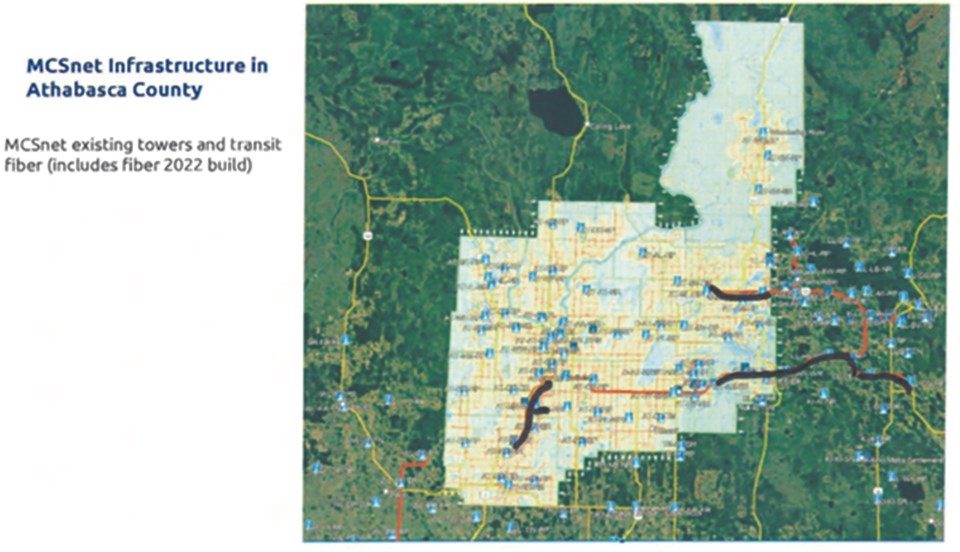ATHABASCA — Soon, smaller communities like Colinton and Grassland will have access to a new form of fibre optic internet.
At the Aug. 9 Athabasca County council meeting, business development manager for MCSnet, Heather Starosielski, told council about the large project the company started working on after the August long weekend.
"(GigAir) creates a mesh network. So, by a mesh network, it's actually working from one node to the next but it's also self-healing meaning a smart technology,” she said. “Let's say for example, there's a power outage at one person's house it actually goes and finds another connectivity to another node.”
The more people in a close area who all sign up for GigAir make the network stronger said Starosielski adding the 90 kilometre, $2.25 million expansion is expected to be completed on Sept. 17, giving Boyle, Colinton, and Grassland access to fibre-optic internet.
“They're using fibre to connect various towers in areas that they already serve, but what that means is better broadband coverage which will create new and improved opportunities for residents and businesses in the community because they'll have access to fibre optic level speeds in places where previously they would be much slower,” Athabasca County reeve Brian Hall said about the expansion.
While this expansion required the county’s approval, their involvement does not extend past that. Fifty per cent of the project is being invested in by MCSnet while the other fifty percent will be covered by the federal Universal Broadband Fund.
“I see that the investment that MCSnet is making is creating a huge opportunity to improve the quality of service in Grassland, Colinton, and Century Estates,” Hall said. “That's a real win for the people that live in those less dense areas, even though the most direct impact will be had in the densely populated zones.”
Not only will this expansion provide faster speeds for those that chose to use the network, but it will also remove additional traffic from pre-existing towers which will bring faster speed for those on other networks as well.
“They'll have access to fibre optic level speeds in places where previously they would be much slower. The impact on county residents is that, generally, faster speeds bring people to rural areas,” Hall said. “It allows some people in rural areas to get services that are closer to what the folks in urban areas have had for years. For example, it allows people to work from home more simply. It allows them to move more data, whether they're doing more Zoom meetings or kids who are working remotely or are doing some online classes. It improves all of those things.”
And the prices will be competitive Starosielski noted; the top package for unlimited residential will be $89.95 per month.
“GigAir provides a fast, cost effective gigabyte connectivity through the air so it's a cheaper alternative to fibre,” she said. “Instead of actually disturbing the infrastructure going into the ground ... we are using 60 gigahertz spectrums which we're able to actually deploy through radio signals 250 metres within one another.”
Having faster speeds in rural areas will open up opportunities for those working remote jobs to move to Athabasca County without sacrificing the internet speed of larger urban centres.
“Outside of the immediate impact on the people who are here right now is that it makes region more attractive as a place for remote work for anyone who really depends on high-speed technology,” Hall said.
While the economic benefits of this may not be seen at once, the hope is that the reduced cost and higher speed will not only leave more money in the pockets of county residents, but it will also contribute to population growth within the community as internet speed will no longer be seen as less than what could be found elsewhere.
“I talked to somebody during the election campaign who had moved into the region because they were able to keep their job in Ontario and work remotely,” he said. “You know, for people like that, broadband coverage is critical.”



